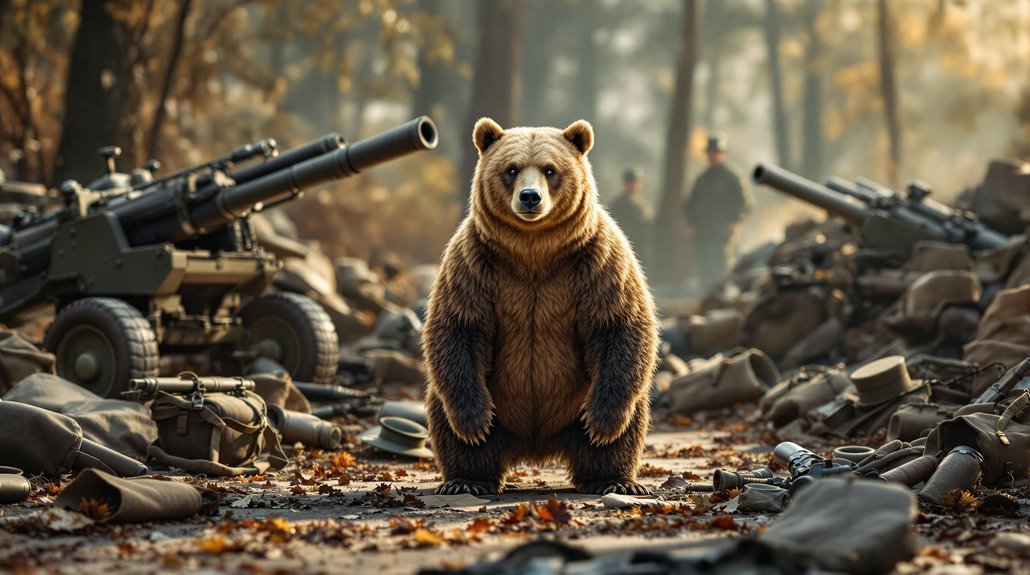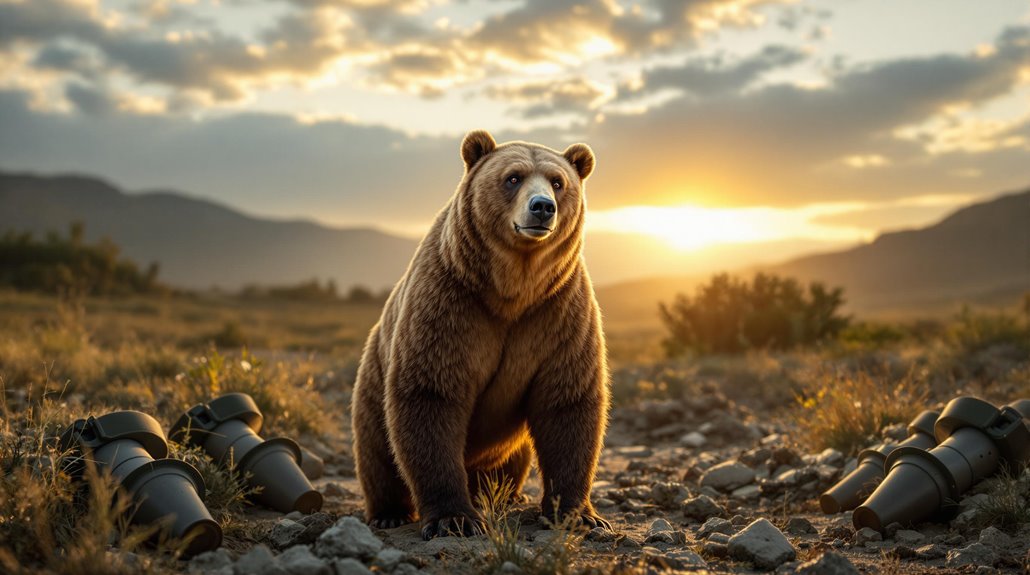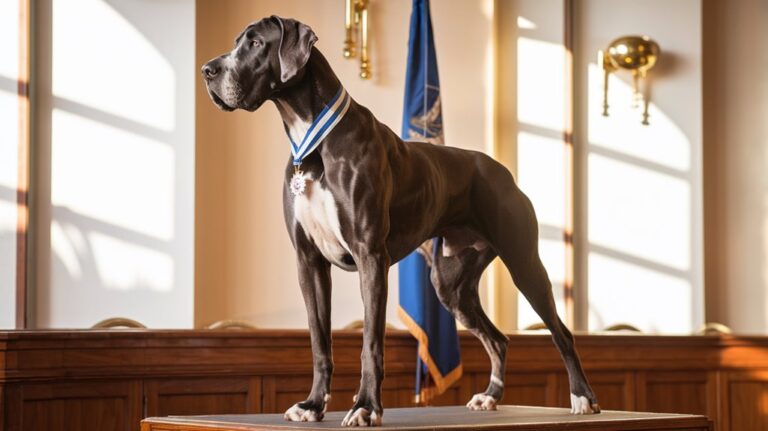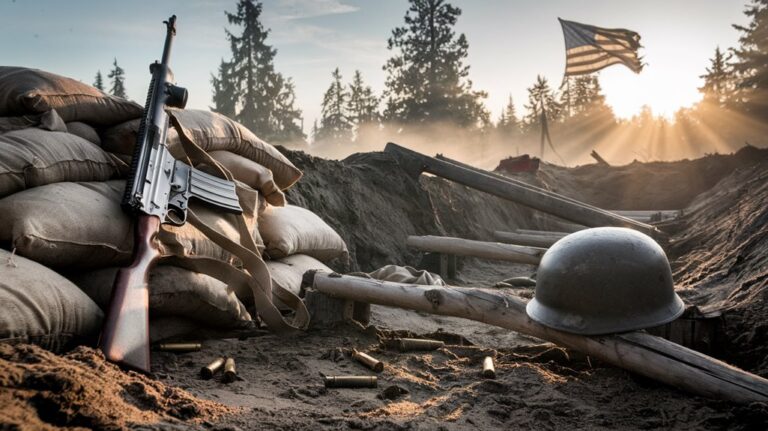A Brown Bear Served as an Army Corporal in WWII
When you think of unlikely war heroes, you probably imagine carrier pigeons or bomb-sniffing dogs, but you've never met Wojtek – a 500-pound brown bear who carried artillery shells through battlefields. As an officially enlisted corporal in the Polish II Corps, this extraordinary animal didn't just boost morale; he became a living symbol of hope during humanity's darkest hours. His remarkable journey from orphaned cub to decorated soldier challenges everything you thought you knew about the bonds formed in wartime.
From Orphaned Cub to Soldier

While World War II produced many remarkable stories, few are as unique as that of Wojtek, a Syrian brown bear cub who became an unlikely soldier in the Polish Army.
After hunters killed his mother in Iran, a young boy found the orphaned cub, who was later purchased by Polish soldiers for food and supplies.
Wojtek's upbringing among the 22nd Artillery Supply Company transformed him from a lost cub into a cherished member of the unit.
Under the initial care of Irena Bokiewicz, an 18-year-old refugee, and Lt. Anatol Tarnowiecki, the bear quickly adapted to military life.
The soldiers discovered that bear companionship boosted their morale as Wojtek learned to salute, wrestle with them, and even share their morning coffee and beer. During the Battle of Monte Cassino in 1944, he earned recognition for moving ammunition crates. The soldiers initially fed him with condensed milk in vodka bottles as a cub.
To keep him with the unit, they officially enlisted him as a private, complete with a paybook and serial number.
Life in the Polish II Corps
As the Polish II Corps grew into a formidable force of over 100,000 soldiers by 1945, Wojtek found himself among a diverse military family that included ethnic Poles, Jews, Belarusians, and Ukrainians.
You'd find him serving alongside soldiers equipped with hundreds of tanks, artillery pieces, and armored vehicles as they fought their way through Italy under British command.
Remarkably, having been officially enlisted as a private and later promoted to corporal, Wojtek demonstrated the unique position he held within the military ranks. His superiors kept him well-fed with honey and marmalade during his service.
The Polish camaraderie that developed within the Corps made Wojtek more than just an animal companion – he became a symbol of unity for troops who'd been evacuated from the Soviet Union and gathered from various Polish units across the Middle East.
As the Corps battled through Monte Cassino and captured Ancona, Wojtek remained with his unit until their transport to Britain in 1946, where many of his fellow soldiers chose to settle in exile.
Combat Service at Monte Cassino
The Battle of Monte Cassino stands as one of World War II's bloodiest conflicts, with over 75,000 casualties across both sides during its four-month siege.
The initial assault by British X Corps began January 17th, facing fierce German opposition.
Under harsh winter conditions, elite German paratroopers held their defensive positions with remarkable tenacity.
While Allied battle strategies focused on breaking through the German Winter Line, an unlikely hero emerged from the Polish II Corps – Wojtek, a Syrian brown bear.
You might wonder about animal welfare during wartime, but Wojtek wasn't just a mascot. As part of the 22nd Transport Company, he actively participated in the fight by carrying heavy ammunition boxes to support Polish troops.
His contribution came during the final Allied assault in May 1944, which proved decisive in capturing the monastery.
When the 12th Podolski Regiment finally raised the Polish flag over Monte Cassino's ruins on May 18, Wojtek had helped pave the way for this historic victory.
Training and Daily Military Routine
Behind Wojtek's heroic actions at Monte Cassino lay months of unique military training and daily routines that transformed him from an orphaned cub into a full-fledged soldier.
You'd find him perfectly adapting to military camaraderie, learning to march on his hind legs and salute just like his fellow soldiers. His bear behavior blended seamlessly with military life as he wrestled with troops, shared their sleeping quarters, and even picked up their habits. The army provided him with double food rations to maintain his massive size and energy. His remarkable strength allowed him to carry artillery shells during combat operations.
- Enjoyed morning coffee and cigarettes like a true soldier
- Marched in formation and carried supply crates
- Received an official paybook and serial number as an enlisted private
- Slept alongside soldiers during cold nights for warmth
- Participated in unit social events, from dances to soccer games
These daily interactions helped forge an unbreakable bond between Wojtek and his unit.
The Journey Through War-Torn Europe

From the remote hills of Iran to the battle-scarred landscapes of Europe, Wojtek's extraordinary wartime journey commenced when Polish soldiers discovered him as an orphaned cub in 1942.
After trading food and supplies for the young bear, the 22nd Artillery Supply Company undertook an epic trek that would take them through the Middle East to Egypt, and eventually to the battlefields of Italy.
You'll find Wojtek's symbolism grew stronger with each mile traveled, as he transformed from a simple mascot into a beloved brother-in-arms. The devastation they witnessed was immense, as cities like Rotterdam lay in ruins from the relentless German bombing campaigns.
The soldier bear bond deepened during the grueling campaigns, particularly at Monte Cassino, where he helped carry ammunition boxes. His dedication earned him a military promotion to the rank of corporal.
As he moved across Europe with the Polish II Corps, Wojtek became more than just a bear – he emerged as a living emblem of Polish resilience, recognized even more than his human counterparts.
A Hero's Retirement in Scotland
After his valiant service in World War II, Wojtek found a new home at Winfield Airfield in Berwickshire, Scotland, alongside 3,000 Polish soldiers who couldn't return to their Soviet-occupied homeland. The bear had earned his place among them after carrying artillery shells during the Battle of Monte Cassino.
You'll find evidence of Wojtek's legacy throughout Scotland today, from his claw marks on a favorite tree to the bronze statues erected in his honor in Edinburgh and Duns.
 honorary Polish-Scottish member of several associations during this time.
honorary Polish-Scottish member of several associations during this time.
His presence helped bridge cultural gaps and create lasting bonds between communities.
- Delighted children by giving them rides on his back
- Appeared on BBC's Blue Peter show
- Enjoyed Scottish treats like honey and jam
- Responded to Polish language until his final days
- Became a beloved symbol of Polish-Scottish friendship










